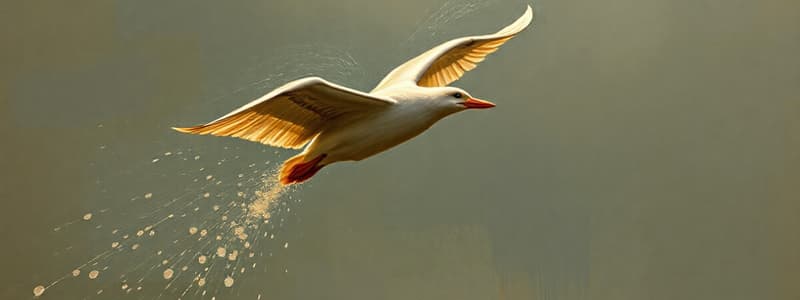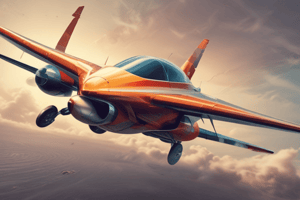Podcast
Questions and Answers
What is Newton's Third Law of motion related to the generation of lift?
What is Newton's Third Law of motion related to the generation of lift?
- For every action, there is an equal and opposite reaction. (correct)
- Lift is only generated by the angle of attack.
- Wings create lift solely based on their shape.
- Air pressure increases as the speed of air decreases.
Which factor does NOT affect the generation of lift?
Which factor does NOT affect the generation of lift?
- Speed of the air around the wing
- Angle of attack
- Color of the wing (correct)
- Shape of the wing
What happens when the angle of attack is increased beyond a certain point?
What happens when the angle of attack is increased beyond a certain point?
- The stall occurs due to separation of airflow. (correct)
- The wing generates more drag instead of lift.
- Lift continues to increase indefinitely.
- The airflow becomes smoother and more efficient.
What is Bernoulli's principle in relation to air pressure and lift?
What is Bernoulli's principle in relation to air pressure and lift?
How does increasing the speed of the aircraft affect lift?
How does increasing the speed of the aircraft affect lift?
What is the primary cause of a stall in an aircraft?
What is the primary cause of a stall in an aircraft?
What role does the angle of attack play in generating lift?
What role does the angle of attack play in generating lift?
What happens to the air pressure when air flows over the curved upper surface of a wing?
What happens to the air pressure when air flows over the curved upper surface of a wing?
What is the Mean Aerodynamic Chord (MAC)?
What is the Mean Aerodynamic Chord (MAC)?
What is the primary purpose of wash out in wing design?
What is the primary purpose of wash out in wing design?
How does propeller torque affect wing design?
How does propeller torque affect wing design?
What is one of the dangers of in-flight icing?
What is one of the dangers of in-flight icing?
What can a thin layer of ice on a wing cause?
What can a thin layer of ice on a wing cause?
What effect does ice build-up have on the wing profile?
What effect does ice build-up have on the wing profile?
What characteristic defines wash in in wing design?
What characteristic defines wash in in wing design?
What can happen if ice builds up unevenly on the wings?
What can happen if ice builds up unevenly on the wings?
Which factor does NOT directly affect the lift produced by an aerofoil?
Which factor does NOT directly affect the lift produced by an aerofoil?
What is the relationship between velocity and lift according to the lift equation?
What is the relationship between velocity and lift according to the lift equation?
Which of the following best describes the optimum angle of attack?
Which of the following best describes the optimum angle of attack?
What does a higher aspect ratio wing indicate?
What does a higher aspect ratio wing indicate?
What components make up the total drag force experienced by an aircraft?
What components make up the total drag force experienced by an aircraft?
In straight and level flight at a constant speed, how do lift and weight compare?
In straight and level flight at a constant speed, how do lift and weight compare?
Which wing shape is known to be the most efficient for flight?
Which wing shape is known to be the most efficient for flight?
What does the term 'mean aerodynamic chord' refer to?
What does the term 'mean aerodynamic chord' refer to?
What happens to the lift coefficient as the aspect ratio is reduced?
What happens to the lift coefficient as the aspect ratio is reduced?
How does angle of attack influence aerodynamic lift?
How does angle of attack influence aerodynamic lift?
What is the primary function of thrust in aircraft flight?
What is the primary function of thrust in aircraft flight?
What aspect of wing shape can affect the stability and control of an aircraft?
What aspect of wing shape can affect the stability and control of an aircraft?
Which wing configuration is most cost-effective to manufacture?
Which wing configuration is most cost-effective to manufacture?
What is the main purpose of the drag coefficient in the drag force equation?
What is the main purpose of the drag coefficient in the drag force equation?
What happens to airflow over an aerofoil as the angle of attack increases?
What happens to airflow over an aerofoil as the angle of attack increases?
What is the critical angle of attack for most aircraft, at which maximum lift occurs?
What is the critical angle of attack for most aircraft, at which maximum lift occurs?
Induced drag is directly related to which factor?
Induced drag is directly related to which factor?
What is the primary cause of parasite drag?
What is the primary cause of parasite drag?
Form drag is primarily influenced by which aspect of the aircraft?
Form drag is primarily influenced by which aspect of the aircraft?
What effect does increasing airspeed generally have on drag?
What effect does increasing airspeed generally have on drag?
Skin friction drag is caused by which characteristic of the aircraft?
Skin friction drag is caused by which characteristic of the aircraft?
At what point does a stall occur in relation to angle of attack?
At what point does a stall occur in relation to angle of attack?
What contributes to the formation of wing-tip vortices?
What contributes to the formation of wing-tip vortices?
Which drag type increases with the square of the airspeed?
Which drag type increases with the square of the airspeed?
What is the outcome of maximum lift being developed at low speeds?
What is the outcome of maximum lift being developed at low speeds?
What is interference drag a result of?
What is interference drag a result of?
At what point is total drag at a minimum?
At what point is total drag at a minimum?
What generates lift for an aircraft?
What generates lift for an aircraft?
Flashcards are hidden until you start studying
Study Notes
Generation of Lift
- Lift is produced by air being deflected downwards by the wing.
- The angle of attack is the angle at which the wing meets the airflow.
- Increased angle of attack deflects air downwards more, increasing lift.
- However, there's a limit to angle of attack, exceeding it causes air to flow unevenly and decreases lift.
- Bernoulli's principle states that faster air creates less pressure.
- Air above the wing moves faster, creating lower pressure than the air below the wing, contributing to lift.
Stalling Angle
- A stall occurs when airflow separates from the wing's upper surface, causing a rapid decrease in lift.
- The airflow becomes turbulent with a greater angle of attack.
- Critical angle of attack, also known as the stalling angle, occurs at around 15 degrees and is when maximum lift is generated.
- An aeroplane can stall at any airspeed, flight attitude, or weight.
Generation of Drag
- Drag is caused by surfaces that deflect or interfere with airflow.
- It acts against the direction of flight.
- Induced drag is caused by the lift generated by the wings.
- It is directly related to the angle of attack.
- Higher angles of attack lead to higher induced drag.
- Wing-tip vortices are created by the spinning air.
- Parasite drag is all drag not related to lift production.
- It is caused by the disruption of airflow around the aircraft surfaces.
Types of Parasite Drag
- Form drag is resistance to motion due to the shape of the aircraft.
- It is created by any structure that protrudes into the airflow.
- Skin friction drag is caused by the roughness of the aircraft's surfaces.
- Interference drag occurs when different air currents meet and interact.
Total Drag
- Total drag is the sum of induced, form, friction, and interference drag.
- There is an optimal airspeed where total drag is at a minimum.
- The maximum range speed is slightly above the minimum drag speed, as flying at the minimum drag speed is unstable.
Lift Coefficient
- Lift is directly proportional to:
- Shape of the aerofoil
- Area of the aerofoil
- Air density
- Speed of the air
- Angle of attack
Drag Coefficient
- The drag force is determined by the drag coefficient, density of air, velocity, and area.
- The drag coefficient is affected by the shape of the aircraft and other factors.
Aerodynamic Curves
- The aerodynamic curve shows a point of intersection at about a 4-degree angle of attack, known as the optimum angle of attack, where the lift-to-drag ratio is best.
Aerodynamic Forces
- The four aerodynamic forces controlling aircraft flight are:
- Lift
- Drag
- Weight
- Thrust
- In straight and level flight, lift equals weight, and thrust equals drag.
Wing Shape
- Planform is the shape of the wing from above or below.
- Common wing shapes:
- Rectangular: cheapest to build.
- Elliptical: most efficient.
- Tapered: compromise between cost and efficiency.
- Sweepback: highest speed.
Wing Geometry
- Chord: straight line connecting leading and trailing edges of an aerofoil.
- Wingspan: distance between the wing tips.
- Wing Area: projected area of the wing.
- Aspect Ratio: wingspan squared divided by the area.
- Mean Aerodynamic Chord (MAC): chord drawn through the center of the aerofoil area.
Wash In and Wash Out
- Wash out: greater angle of incidence at the root of the wing than at the tip.
- Wash in: greater angle of incidence at the tip than at the root.
- Wash out improves stability in stall conditions by stalling the root section first.
Icing Effects
- In-flight icing can disrupt airflow, reducing control and performance.
- Ice increases the stall angle and reduces lift.
- Uneven ice build-up can affect balance and roll control.
Studying That Suits You
Use AI to generate personalized quizzes and flashcards to suit your learning preferences.




